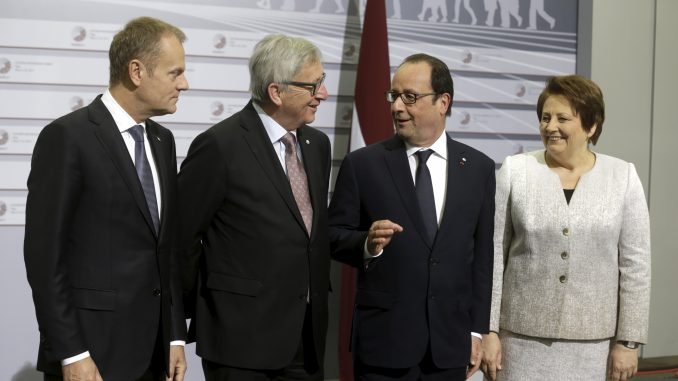
This designation alone reveals the essence of Russian diplomacy which refuses to operate on the post-Cold-War model of international peace, but rather adheres to the might-makes-right principle that inevitably leads to armed conflicts. The Western civilization rejected the principle after two bloody world wars, while Russia has failed to leave the past behind and continues to roam over the world with this antiquated but very dangerous slogan.
Lithuania, too, used to be called the “near abroad” by Russia, but after we joined NATO, we’ve been hearing the designation less often. Seems like we dodged the bullet. Norway has never been Russia’s “near abroad”, although they share a border – after all, Norway has been a long-time NATO member.
Today, the “near abroad” that Russia cares about so much consists of the six Eastern Partnership countries. How does the Kremlin treat them?
Russian threat as the common denominator
Armenia and Azerbaijan are locked in a conflict over Nagorno-Karabakh, where the Russians are playing peacekeepers, but in fact are escalating tensions by supporting militarily the weak Armenia with Russian bases in its territory or, alternatively, selling arms to the rich Azerbaijan. There is no effort to control or solve the situation, since only in conflict can Russia see itself as a consequential power. It does not really matter that no one benefits from it.
Moldova, too, has a source of instability in its territory – the unrecognised Republic of Transnistria, sustained by Russian money and military power. The minute Moldova takes a step towards building a European state, Moscow slams the brakes by inducing the Gagauz autonomous district start shouting slogans about secession from Moldova.
Georgia under president Mikhail Saakashvili took impressive strides implementing reforms and transforming itself from a poor vassal state to a Western country. Impatient with the Georgian success, in 2008 Russia attacked its neighbour and tore away some of its territory. Only a very strong warning from the White House prevented Russian tanks from driving to Tbilisi.
The Eastern Partnership programme was built on the realization that Europe cannot watch idly how the Russian bear was eating up its neighbours, sovereign twenty-first-century states. The EU, the richest union of nations on Earth, offered an alternative for the six countries, to learn from the European success.
Russia immediately decided that this posed threat to its domination, because Moscow’s vassals can learn to be independent. More precisely, Russia is convinced that the EU is motivated by the same desire – to dominate the neighbouring countries. One judges everything by one’s own standards, so the Kremlin is suspicious of events like the recent Riga Summit – it sees them as military-like leadership gatherings that have one item on the agenda, to subjugate mother Russia. If only Russia itself had as many allies – it would soon bring all weaker countries into line.
EU documents state very clearly that the Eastern Partnership programme is aimed at rapprochement, not membership. But after Russia imposed its own view, even the participating countries themselves forget the original intention and start judging the success or failure of the programme in terms of “membership or no membership”, which is not even on the table.
After the third Eastern Partnership Summit in Vilnius, when the then president of Ukraine, Viktor Yanukovych, refused to ink an association agreement, Ukrainians had had enough. Once more, Russia found no better way to convince of its own attractiveness and superiority than by occupying foreign territory. Moscow could not possibly have expected that this would make Ukrainians run into its embrace. What happened was the opposite, as it should be expected. Friendship between the two nations gave way to mutual enmity.
Right now, Belarus is the only one of the six that is not involved in any military stand-off with Russia. President Alexander Lukashenko is trying to pull off a major balancing act, so far successfully, although he knows as well as anyone else that, unless Minsk can counterbalance Moscow with the EU, Russia will eat him up.
Right before the Riga Summit, Russian foreign minister Sergey Lavrov repeated once again that EU leaders had to stick to former promises that the Eastern Partnership programme would not in any way interfere with Russia’s interests in the “near abroad”. Actual behaviour of the Russians follow another rule: the more transparent and reformed a neighbouring country gets, the more pressure from Moscow it is subjected to.

Be the first to comment